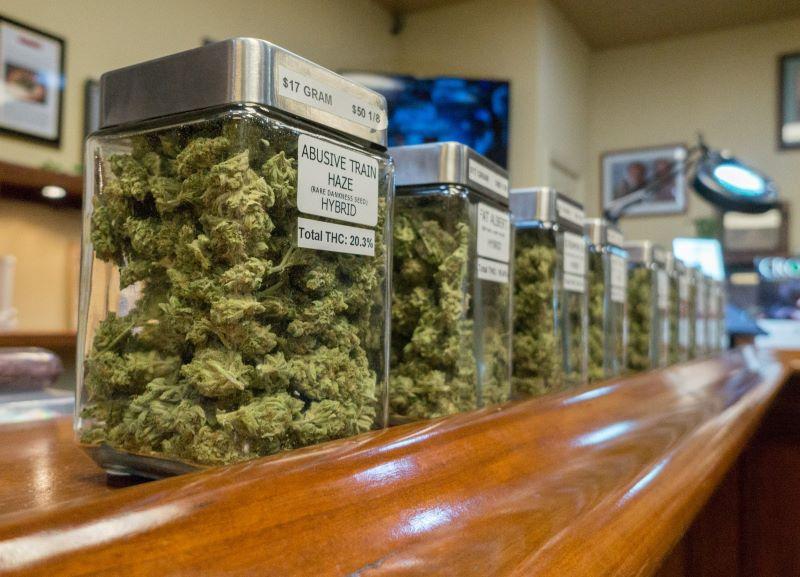Get Healthy!

- Posted January 9, 2023
Many Turn to Weed to Ease Chronic Pain in States Where It's Legal
People who use medical marijuana to treat their chronic pain tend to cut their use of opioids and other painkillers, but the trend may also have a downside, a new survey shows.
Folks treating chronic pain with cannabis reduced by more than 50%, on average, their use of prescription opioids, other prescription painkillers and even over-the-counter pain medications like aspirin, acetaminophen (Tylenol) or naproxen (Aleve), the researchers reported.
"Most people who use cannabis to manage their chronic pain have said that in doing so, it resulted in lower use of their prescription medicines and specifically prescription opioids,"said lead researcher Dr. Mark Bicket. He is an assistant professor of anesthesiology with the University of Michigan's School of Public Health, in Ann Arbor.
Less use of prescription opioids would seem like a good thing, given the ongoing U.S. opioid crisis.
The number of U.S. drug overdose deaths has quintupled since 1999, and nearly three out of four overdose deaths in 2020 involved an opioid, according to the U.S. Centers for Disease Control and Prevention.
But some chronic pain patients who use medical marijuana may also tend to stop trying non-drug therapies proven to help, including physical therapy, meditation and cognitive behavioral therapy, the researchers found.
What's more, people ditching their prescription drugs for marijuana are relying on a medication that still doesn't have a lot of evidence behind it, Bicket added.
The survey results "really underscore the need for research on the benefits and risks of using cannabis for chronic pain,"Bicket said. "Cannabis is accessible as a treatment for chronic pain for most adults in the United States, but we don't know how safe and effective cannabis is for chronic pain."
For this study, Bicket and his colleagues surveyed more than 1,600 people suffering from chronic pain that wasn't related to cancer.
Three out of 10 people said they had tried cannabis to treat their pain, and most of those patients reported that they wound up substituting weed in place of other painkillers.
The findings were published online Jan. 6 in JAMA Network Open.
Marijuana has a small effect on a person's perception of pain, but its real benefit appears to come from easing the fear and anxiety that accompanies and exacerbates chronic pain, said Dr. Steven Cohen, director of the Blaustein Pain Treatment Center at Johns Hopkins Medicine, in Baltimore.
"It definitely doesn't work better than other things, like anti-inflammatory drugs or opioids, at least acutely. But I think it works a lot on the affective component of pain,"Cohen said.
Unfortunately, cannabis also led some people to eschew pain management techniques that don't rely on a pill or injection.
About 39% said their marijuana use had led to decreased use of physical therapy, 19% said they meditated less and 26% said they didn't use cognitive behavioral therapy to manage their pain as often.
"Typically the treatments that aren't drugs, the non-pharmacological therapies, have been thought of to be first-line therapies, because their benefits typically far outweigh the risks,"Bicket said. "For many types of chronic pain, physical therapy is part of the first step. So things that would take the place of that, you would really want to seriously question if that were the right move or not."
There aren't any U.S. Food and Drug Administration-approved uses for medical marijuana in terms of chronic pain, Bicket noted.
Further, weed purchased from dispensaries can vary widely in terms of the levels of different chemicals like cannabidiol (CBD) and THC -- the component that causes intoxication, Bicket and Cohen said.
"If I write a prescription for gabapentin or I write a prescription for oxycodone, I give a specific amount of medication, I tell people how to take it, and I monitor them,"Cohen said. "The issue with medical marijuana is that we're not actually prescribing it. We're certifying that people have a condition that might be amenable to treatment."
Medical marijuana needs to be better regulated and understood if it's to become a legitimate substitute for other pain therapies, the experts concluded.
"Right now with cannabis, it's a big question mark whether the risks are larger than the benefits,"Bicket said. "We need additional information to give to patients about how it would work for them."
More information
The U.S. Centers for Disease Control and Prevention has more about marijuana use for chronic pain.
SOURCES: Mark Bicket, MD, PhD, assistant professor, anesthesiology, University of Michigan School of Public Health, Ann Arbor; Steven Cohen, MD, director, Blaustein Pain Treatment Center, Johns Hopkins Medicine, Baltimore; JAMA Network Open, Jan. 6, 2023, online







